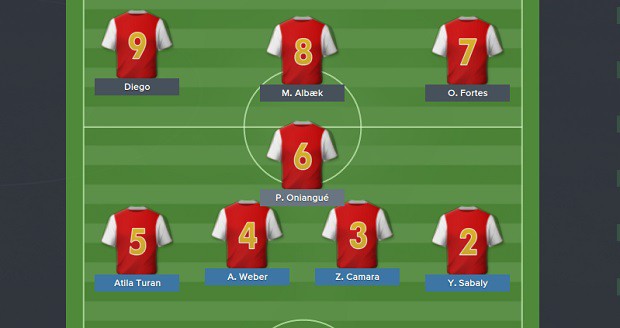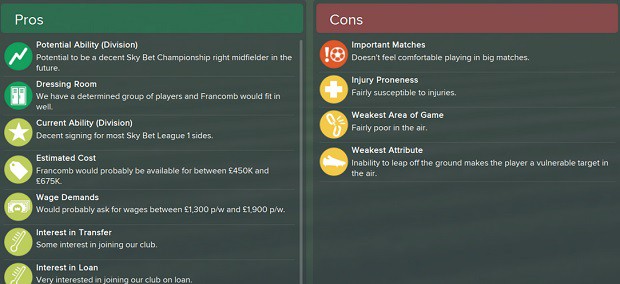Wot I Think: Football Manager 2015
A year of transition and other clichés
Another year, another trip to the dugout. It's tempting to think of football as nothing more than a billionaire's playground wracked with corruption and capable of reducing a supporter to tears for all the wrong reasons. The beautiful game can be extremely ugly. But there are still tales of tiny triumphs, of giant killing and last minute survival, and of windswept terraces on a winter's evening. Football Manager 2015 captures the tears and the triumphs, but this year there's a somewhat heavier dose of the former. Here's wot I think.
There are some people, I'm reliably informed by internet forums and comments, who skip a year of Football Manager when the vintage doesn't seem particularly potent. I'm not one of those people.
For those who do buy the new version every year, the opportunity to access accurate real world data and updated player ratings is a big draw. I'm not a slave to the real world data because a huge part of my interest in the game lies in its ability to create alternate footballing futures - starting with a new season's release feels like hitting the reset button on a fascinating scientific experiment. All deviations from the norm are expunged and I'm back in the same world that everyone else is playing in.
In that sense, while I appreciate the accuracy of the fresh data, it's also something of a gale force wind that doesn't care for the house of cards Panini Stickers I've been building. My final FM 14 career ran into 2036 and I decided from the beginning that I'd manage teams in as many countries as possible. Sources tell me that David Moyes has now decided to emulate my globetrotting, with a post in the Peruvian second division lined up for the 2015/16 season.
Why move on to a new version of the game at all then? I could join the historical dugouts in which Champ Manager 01/02 is still considered the pinnacle of the beautiful game rather than abandoning the world I've built every time September rolls around, preparing to start all over again.
Beyond the trickiness of the tactics and the narrative evolution of the simulated world, Football Manager fascinates me because it's a series that has arguably come close to perfecting its formula in the past. Instead of simply updating teamsheets, however, Sports Interactive have rewritten entire sections of the game, as well as adding components to reflect the changing nature of football.
I usually find the process interesting even when the results are disappointing. This release is an exception. For the first time in years, Football Manager's arrival is making me nostalgic for the past rather than excited about the resent. I've still moved on, FM 14 now relegated to whatever void lies beyond the Recycle Bin, but if there's anything outstanding to justify the leap, I haven't found it yet.
In recent years, the direction of the series has shifted significantly. Broadly speaking, Football Manager is moving away from the abstract - slider bars and stats - and toward a simualtion of the actual duties of a human being responsible for the management of a football team. There are still levels of abstraction of course - no Oculus Rift enabled simulation of kicking a boot at someone's hairdo while surrounded by naked sweaty men - but the emphasis is on giving instructions to and having conversations with individual entities rather than controlling a sheet of stats from on high.
For me, the infiltration of RPG mechanics into the game is a positive. Player roles, which have been expanded and improved this year, are more immediately engaging than the paradoxically vague precision of a screenful of sliders, and private conversations and team meetings add personality to the game. Interactions with figures in the media, board members and players are all as good as they've ever been, and there's the tantalising glimpse of what they might eventually become, but FM 15 is one more step down a long road.
With the previous release, Sports Interactive reached one of their destinations, overhauling the treatment of tactics. While the character-driven aspects of the series expanded in 14 as well, they represented the beginning of an idea rather than the end of it. Relationships need to matter over time, in a business which involves movement from club to club, and changing allegiances, as well as pressure to produce results, from media and managers alike.
FM 15 pushes toward a system that makes the most of rivalries, playing on memories of victories and losses past, as well as harsh words exchanged via the distorting megaphone of the media. In the number-crunching, behind the scenes, there is probably a lot of machinery driving these relationships than there was in FM 14, but the shift toward convincing 'actors' rather than datasheets makes me more inclined to judge what's on-stage rather than the elements working in the wings.
For those who delegate teamtalks and press conferences, a swathe of the additions will be meaningless, and for those of us who enjoy the roleplay aspect of the game, there's precious little new in terms of dialogue options or reactions. Within a couple of seasons, conversations and conferences have become as predictable and repetitive as Andy Townsend's commentary.
Similarly, Player Roles haven't been changed drastically. I've found the four new entries far more useful at higher level management jobs than in my current role at Bury FC (like a frustrated Junior Executive, I narrowly missed promotion in 2014/15 and 2015/16, lived beyond my means and am now struggling with my finances) but that's probably realistic. Tell some meat and potatoes league two defender to perform as an inverted wing back and he'll probably just ask you who he's supposed to be man-hugging during corner kicks.
The new match engine is attractive, but I've seen more defensive blunders than should be expected. Particularly when leaving a through ball for the goalkeeper, players seem to have a habit of switching off despite the presence of an opponent and the static nature of the man between the sticks. There have already been improvements during the beta stage but in attacking play, shots from extremely tight angles seem to hit the target more often than is probable. Players know this as well, able to calculate the uncanny odds and preferring to take a pop rather than cutting the ball back to a chum.
In terms of outright success, the interface and scouting are the places to look. The interface takes a while to get the hang of, like updating your OS and finding buttons have shifted around the screen, but information is linked intelligently from page to page, and it's possible to perform most minor duties by clicking through from the newsfeed rather than delving into submenus. If anything has convinced me that the jump to FM 15 was worthwhile, it's that. The interface changes.
Complex and potentially confusing as the game is, a cleverly rejigged interface isn't to be sniffed at but it's disappointing not to be enthusing about the character creation or relationships instead. The line between tracksuit and tactical manager, and the stats that go toward your player character, don't have enough of a direct impact on the day-to-day job to be meaningful. Once I'd clicked through the options at the beginning of my career, I didn't find reason to think about them again.
Scouting is more pleasing, and in keeping with the more believable trajectory of the series. An unknown talent is no longer Schrödinger's youth player, with the potential to be either a mess or a Messi while an unknown quantity, and only revealed to be one or the other as soon as scout looks at him. Scouting a player now narrows the range of his stats and the more you look, the more accurate the readings become. Having knowledge of different geographical areas and competitions, or scouts in position to keep an eye on regions and individuals, pulls every stat toward its true number. Manage a poverty-stricken club and you're doomed to take a punt on players represented by a muddle of numbers. Sign them, become familiar with their foibles, and the horrible truth is revealed.
Credit should be given to the reactive tactics of opposing managers as well, although it's impossible to judge how well that feature will hold up over months of playing. There does seem to be a more direct and obvious reaction to situations in a match though, with more flexibility on show from the AI. Tactical substitutions, reactions to injuries and going behind, and counters to the player's own plans all seem more varied and more direct.
There's no doubt that come this time next year, I'll have played FM 15 more than just about any other game. It's a fixture in my life and this version isn't fundamentally flawed, but on the surface it's a baby step in the ongoing process and the majority of the changes feel like the edges of systems that are still working toward career-long implementation.
Last year, I said that FM 14 "feels like the pinnacle of this particular generation" and perhaps that was true in part, but the nature of the series is that where the tactical overhaul was all but completed, the mechanical introduction of character had only just begun. FM 15's expansion of the simulation and continued introduction of roleplaying aspects is building toward something but at the moment, there's still a lot of scaffolding in place.






